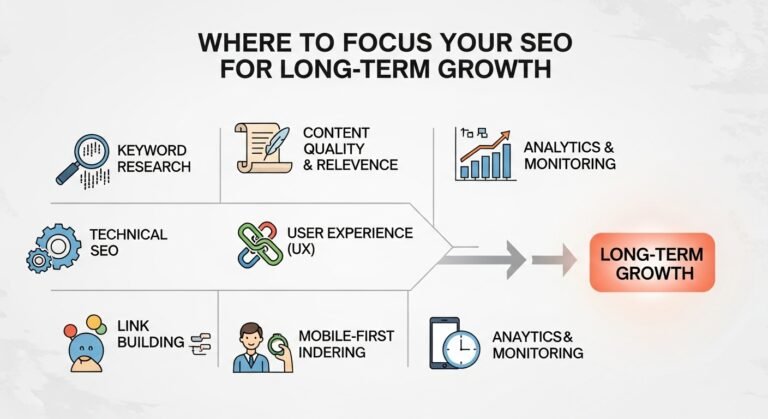AI Overview: Why Long-Term SEO Matters After Google’s Spam Update
Google’s spam updates have reshaped the way websites earn visibility. Shallow, keyword-stuffed pages are quickly being filtered out, while high-quality, original content gets rewarded. On top of that, AI-generated overviews are beginning to dominate search results, pulling information from trustworthy, structured, and useful sources.
This means businesses can no longer rely on quick SEO tricks. Sustainable rankings now come from a long-term strategy centered around seo keyword research, evergreen content, and building authority step by step.
Understanding the Foundation of Long-Term SEO
SEO Is a Marathon, Not a Sprint
SEO doesn’t deliver instant results like paid ads. Instead, it compounds over time. Every optimized article, every backlink, and every technical improvement contributes to long-term growth.
Why Businesses Fail with SEO
Many companies fall into the trap of chasing short-term wins, such as ranking for a trending keyword. This may drive traffic temporarily, but it rarely lasts. A smarter approach is to invest in seo keyword research that identifies evergreen topics people will continue to search for in the future.
Step 1: Make SEO Keyword Research Your Cornerstone
What Is SEO Keyword Research?
SEO keyword research is the process of identifying the words and phrases your audience uses to find answers, products, or services online. For long-term growth, the focus should be on keywords that carry consistent value rather than short-lived spikes in interest.
Why It Matters for Long-Term Growth
Effective seo keyword research provides the foundation for all your content and optimization efforts. It helps attract consistent organic traffic, ensures your content aligns with user intent, builds authority, and keeps your site resilient against algorithm updates.
Balancing Short-Tail and Long-Tail Keywords
Short-tail keywords are broad but competitive, while long-tail keywords are more specific and often easier to rank for. For example:
• Short-tail: SEO tools
• Long-tail: best seo keyword research tools for small businesses
The second option is more likely to bring in readers who are ready to act and continues to stay relevant over time.
Step 2: Focus on Evergreen Content That Compounds
What Is Evergreen Content?
Evergreen content is material that remains valuable long after it’s published. Instead of fading with a trend, it continues to attract readers, backlinks, and search rankings.
Examples include:
• How to Do SEO Keyword Research Step by Step
• Beginner’s Guide to On-Page SEO
• What Is Link Building and Why It Matters
Why Evergreen Content Matters
Evergreen posts strengthen long-term SEO by generating traffic consistently. When paired with seo keyword research, they work like seeds that keep producing results for months or years.
Step 3: Optimize for AI Overviews and Future Search
What Are AI Overviews?
AI overviews are summaries that appear directly on search results pages, offering instant answers to user questions.
How to Adapt
To optimize for these, write clear and structured content, use headings to organize your answers, and include relevant keywords naturally, such as those from SEO keyword research. Avoid stuffing keywords because Google’s spam update penalizes overuse.
By straightforwardly presenting information, you increase the likelihood of your content being featured in AI overviews.
Step 4: Build Topical Authority

Why Authority Wins in SEO
Search engines reward websites that consistently demonstrate expertise on a subject. Publishing multiple high-quality posts on seo keyword research and related topics signals to Google that your site is an authority.
Ways to Build Authority
Create pillar pages that cover core topics in depth. Interlink supporting posts to strengthen your site’s structure. Keep updating content to stay fresh. Earn backlinks by sharing insights and thought leadership in your field.
Authority builds slowly, but once established, it makes your site far more resilient to competition.
Step 5: Don’t Ignore Technical SEO
Content is crucial, but technical health is just as important. Without a strong foundation, even great articles won’t reach their potential.
Keep an eye on factors like page speed, mobile optimization, site structure, schema markup, and security. Together with solid seo keyword research, these elements ensure your content gets the visibility it deserves.
Step 6: Measure and Refine Continuously
SEO is not something you can set and forget. Search intent shifts, algorithms change, and competitors adapt.
Use tools like Google Search Console to track performance, Ahrefs or SEMrush for competitor and keyword analysis, and Google Analytics 4 to understand traffic behavior. Regular monitoring lets you refine your approach and double down on what’s working.
Step 7: Align SEO with Business Goals
SEO isn’t just about rankings—it’s about supporting your overall business strategy.
If you run a SaaS company, your seo keyword research should target queries around the problems your software solves. If you run an e-commerce store, your focus should be on long-tail product and category keywords that capture buying intent.
When SEO directly ties into business objectives, every blog post and campaign contributes to growth in a meaningful way.
Common Mistakes to Avoid in Long-Term SEO
Over-Optimizing with Keywords
Keyword stuffing not only ruins readability but is now penalized by Google’s spam updates. Instead, focus on the natural placement of your target terms, like seo keyword research, spread throughout your content.
Ignoring User Intent
Ranking for a keyword isn’t enough—you need to deliver on the promise of the search query. If your headline offers a step-by-step guide, the article must follow through with actionable steps.
Chasing Trends Only
Trendy topics can be useful for quick traffic spikes, but won’t sustain long-term growth. A balanced strategy includes both evergreen and time-sensitive content.
Final Thoughts: Where to Focus Your SEO for Long-Term Growth
Lasting success in SEO comes from focusing on strategies that compound over time. The most important areas include making seo keyword research the foundation of your strategy, creating evergreen content, adapting to AI overviews, building topical authority, maintaining technical SEO, and refining your approach with data.
By committing to these areas, you build more than just search engine visibility. You create a digital presence that continuously attracts traffic, builds trust, and drives growth for years to come.
Frequently Asked Questions
What is the role of SEO keyword research in long-term growth?
It helps you uncover the search terms your audience is actually using. By targeting evergreen and valuable keywords, you ensure your content ranks steadily over time instead of fading away.
How often should I update my SEO keyword research strategy?
Review your strategy every three to six months. Search behavior changes, new competitors appear, and algorithm updates shift the landscape. Regular updates keep your content relevant.
Is SEO keyword research still important with AI overviews?
Yes. AI overviews use content from authoritative sources. If your writing is backed by solid seo keyword research and structured clearly, you have a stronger chance of being cited.
What tools are best for long-term SEO keyword research?
Popular options include Ahrefs, SEMrush, Moz, and Google Keyword Planner. They help you uncover long-tail opportunities, track performance, and refine your strategy.
Can small businesses benefit from seo keyword research?
Definitely. By focusing on niche, long-tail keywords, small businesses can compete effectively with larger brands and attract high-quality traffic.
How many times should I use my target keyword in a blog post?
For a long article like this, seven to ten natural mentions are ideal. The focus should always be on readability rather than forcing a keyword in.
What’s the difference between short-term SEO and long-term SEO?
Short-term SEO often chases quick wins with trendy topics or easy tricks, while long-term SEO focuses on sustainable growth strategies like evergreen content, seo keyword research, and authority building.



